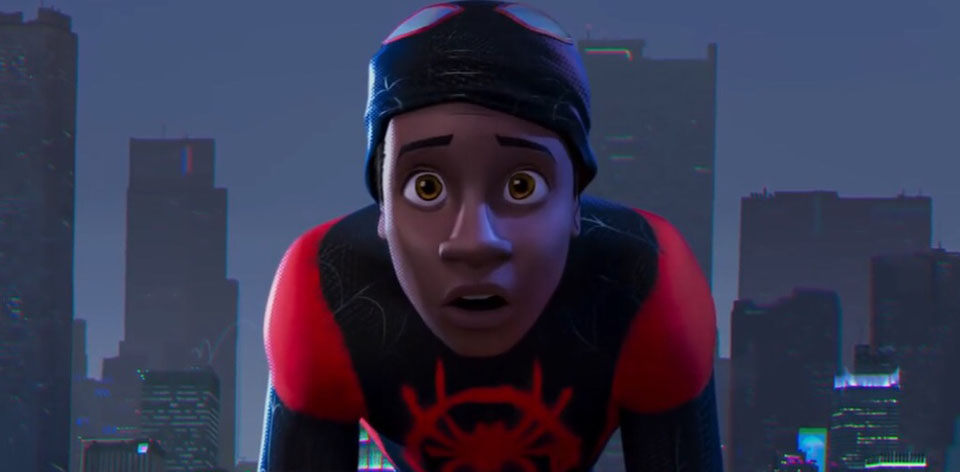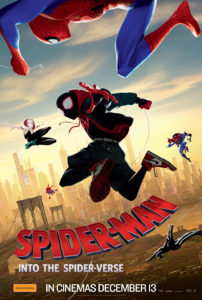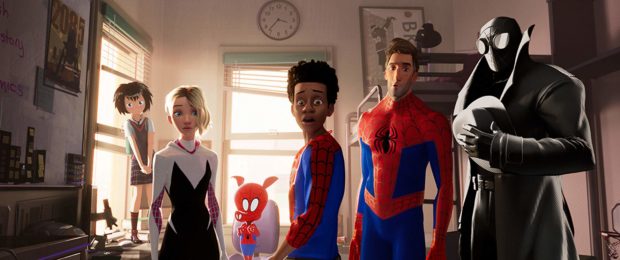It’s been a massive year already for comic book movies, with Avengers: Infinity War sucking most of the air of the room. Yet it turns out it wasn’t the final word on cinematic superheroics. The 2014-2015 Spider-Verse comic book event claimed to have “Every Spider-Man ever” in print, even including the 1960s animated version, the India-based Pavitr Prabhakar, and Japanese Spider-Man’s Leopardon in the line-up. SPIDER-MAN: INTO THE SPIDER-VERSE is a loose adaptation that has waltzed out of our dreams and onto our screens with a psychadelic swirl of Ben-Day dots.
From the energetic opening sequence, Phil Lord and Rodney Rothman’s screenplay acknowledges the webslinger’s storied past. With visual references to Sam Raimi’s trilogy and the Amazing Spider-Man films, it’s a tip of the hat to just how comics literate audiences have become in the last decade or so. We immediately take a left turn into the world of Ultimate Spider-Man and get introduced to Miles Morales (voiced by Shameik Moore), a teenager dealing with high-school until he is bitten by a radioactive spider. His newfound abilities coincide with Kingpin (Liev Schreiber) cracking open a rift in space-time, and Peter Parker/Spider-Man being killed in the attempt to stop him.
Miles is left as the sole inheritor to the Spider-Man mantle, at least until it’s revealed that several other enhanced spider-people have entered his reality from across the Multiverse: Spider-Gwen (Hailee Steinfeld), the Gwen Stacey of her Earth who survived in Peter’s place; the cartoony Spider-Ham (John Mulaney); the James Cagney-esque Spider-Man Noir (Nicolas Cage); and Peni Parker (aka SP//dr, voiced by Kimiko Glenn). Peter B. Parker (Jake Johnson in some inspired casting) is an older Spider-Man who is having a major mid-life moment and serves as a reluctant mentor to Miles.
It’s difficult to quantify exactly what this film means to us comic book fans. Over the last few decades we have watched various studios make soaring successes and massive misfires based on comic properties, and even the best of them didn’t get it quite right. SPIDER-MAN: INTO THE SPIDER-VERSE is an unabashed love letter to every era of comic books. While it sticks primarily to the main 6 heroes, there are references to so many comic book moments, classic film scenes, and retro cartoons that this tribute may elicit a few tears of joy. (The inevitable Stan Lee cameo will also lead to some gentle sobs, the appearance serving a tribute to his entire legacy in the wake of his recent passing).
Yet having Miles Morales as the lead is a long overdue move for Sony. If you’ve been paying attention to the angry and violent voices of Comicsgate, the harassment movement has often claimed that minority characters in comics is the equivalent to pushing diversity into “their” comics. Well d’uh. The half-black, half-Hispanic Miles Morales was first introduced back in 2011, and commentators such as Chris Huntington of The New York Times reminded us why it was important that children of all backgrounds needed heroes that represented them. Despite starting as a fledgling teenage with powers, his heroism in this film is ultimately defined by how his individual strength and differences make him unique in a pantheon of Spider-Men.
The film stylistically immerses viewers in the trappings of sequential art without being tied to it. Directors Bob Persichetti, Peter Ramsey, and Rodney Rothman – along with producers Lord and Christopher Miller – aimed to make the film look like a comic book. Where some films misunderstood the way panels and onomatopoeia work (See: Ang Lee’s Hulk), here it’s a celebration of the form. Backgrounds look like unfocused 3D and give depth to the primary character animation. Selected voice-overs appear in text boxes, while “THWIP!” appears on screen during action sequences. The stunning autumnal forest escape, one that introduces Spider-Gwen, is a masterclass in action animation.
It’s rare that a film is so unapologetically made for the True Believers but at the same time manages a universal appeal. Not only is SPIDER-MAN: INTO THE SPIDER-VERSE one of the best adaptations since the 1990s Spider-Man series, but one of the best comic adaptations of the last few years in any medium. Be sure to stay through the credits for some more references to classic Spidey and a post-credit sequence that rewards fans without taking itself seriously in the slightest.
[stextbox id=”grey” bgcolor=”F2F2F2″ mleft=”5″ mright=”5″ image=”null”]2018 | US | DIR: Bob Persichetti, Peter Ramsey and Rodney Rothman | WRITERS: Phil Lord, Rodney Rothman | CAST: Shameik Moore, Hailee Steinfeld, Mahershala Ali, Jake Johnson, Liev Schreiber, Brian Tyree Henry, Luna Lauren Velez, Lily Tomlin | RUNNING TIME: 117 minutes | DISTRIBUTOR: Sony Pictures Releasing (AUS) | RELEASE DATE: 13 December 2018 (AUS), 14 December 2018 (US)[/stextbox]






